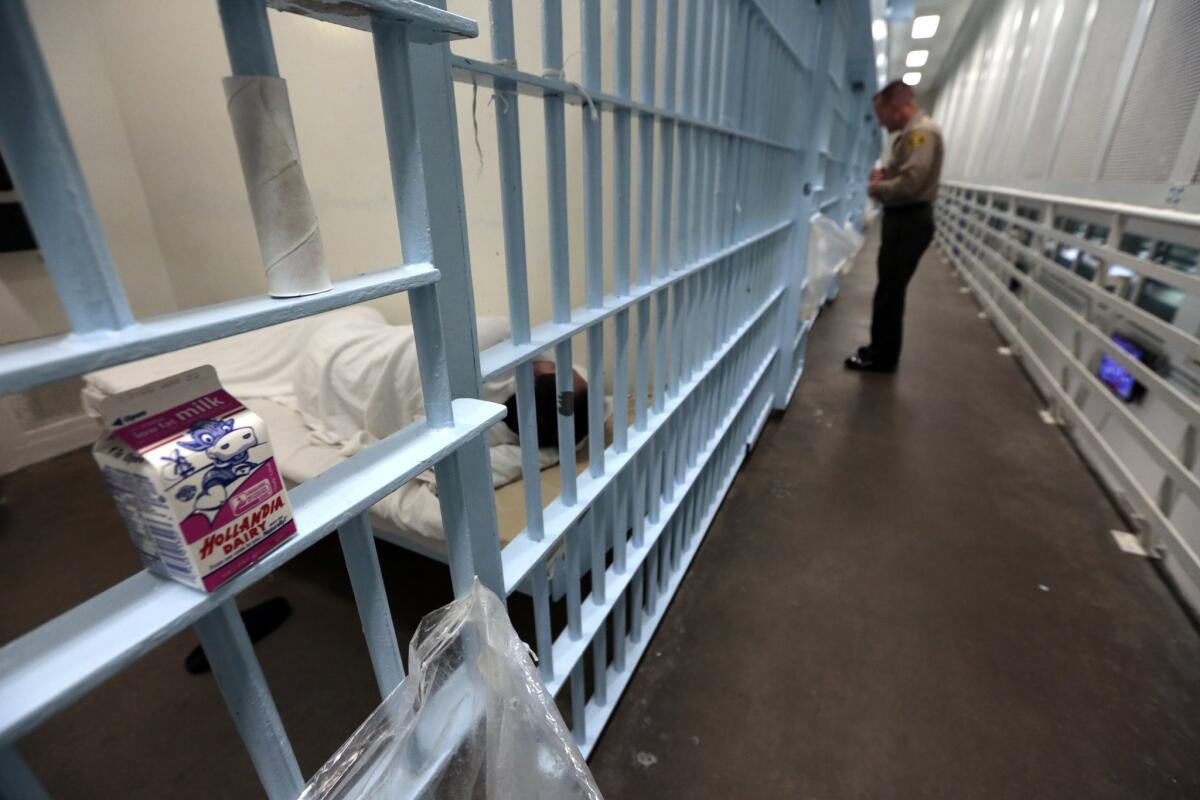Endorsement: Yes on Proposition 25 to end bail and the poverty penalty

- Share via
There is something repugnant, and corrosive to our collective notion of justice, about allowing people without money to stay locked up in jail while others, accused of the same crimes but with money to spend, can buy their way out. That’s bail in a nutshell. It’s a mechanism to divide the privileged from the punished in the earliest phase of a criminal proceeding, long before any judge or jury makes a finding of guilt or innocence. It is the ultimate insult to our justice system’s claim that all stand equal before the law, and that all are presumed innocent until proved guilty.
California has been trying to rid itself of money bail for decades, but every effort has been turned back by the bail bond industry and the insurance companies that support them.
A bill to finally eliminate bail — known as Senate Bill 10 — was signed into law in 2018, and of course the bail bond industry responded with a campaign to suspend the law and let voters decide its fate. That’s where we are now. Proposition 25 would put the long-delayed law into effect, end the bail industry in California and end the use of wealth or poverty to determine whether a person accused of a crime stays in jail or goes home before trial. Voters should support it. A “yes” vote helps wash away a stain on our justice system.
In theory (and on TV), an arrested person goes to an arraignment hearing, where the judge consults a “bail schedule” that assigns certain amounts to different charges. Bail is set, a relative drops by with the money, the defendant goes home, and preparation for trial begins. When everything’s over, the money is returned.
In reality, a suspect is more often brought to the police station to be booked, and there — without a hearing, without a lawyer and without a plea — an officer pulls out the bail schedule and tells the defendant to pay up or else be transported to jail to wait a day, a week or more before finally being brought before the judge. The officer will direct the defendant to a poster that lists various bail bond agencies. One of those agents will promise to bail out the defendant, for a price — usually about 10% of the full bail amount. The money will never be returned. Only in the United States and the Philippines are commercial bail bond agents legal.
A study by the Million Dollar Hoods project at UCLA found that the Los Angeles Police Department levied nearly $19 billion in bail on people arrested between 2012 and 2016. Most couldn’t pay and were sent to County Jail until they pleaded guilty or went to trial. But for those whose families (most often mothers, grandmothers and wives, according to Million Dollar Hoods) could scrape together the money to pay bail agents, that meant millions of dollars extracted most often from the city’s poorest communities, and largely its Latino and Black families.
Proposition 25 ends pretrial detention outright for people accused of most crimes, even if they have no money. Those accused of the most violent and serious crimes stay in jail before trial, even if they are rich, on the presumption they would otherwise flee or threaten their communities. For most crimes in between, defendants are brought before the judge, who will determine the defendant’s likelihood to appear for later hearings and avoid trouble while awaiting trial. The judge will consult algorithms that will help assess risk, and will assign conditions of release appropriate to the defendant’s circumstances. No more determinations based on wealth or poverty. No more bail bond agents.
The bond industry, recognizing its unpopularity, has been largely quiet during the campaign, leaving the most cogent arguments against Proposition 25 to be made not by the industry’s allies but by some of the bail system’s most steadfast opponents. These critics argue that the algorithms that would guide pretrial detention decisions would exacerbate structural inequity, judging defendants’ riskiness by circumstances that put Black and Latino defendants at a disadvantage, such as the amount of crime in their neighborhoods and previous encounters they’ve had with police. They also argue that some people may stay in jail even longer before seeing a judge. Instead of the system offered by Proposition 25, they call for almost universal pretrial release of defendants regardless of risk.
They are correct that the ballot measure is imperfect, but there must remain adequate safeguards for public safety. Besides, SB 10 and other laws adopted in its wake include processes for monitoring compliance, correcting problems and working out the kinks in the interests of justice. The mandate to analyze pretrial detention data will provide a long-overdue examination of California court operations and disparities among counties. Proposition 25 is an important step toward better justice.
More to Read
A cure for the common opinion
Get thought-provoking perspectives with our weekly newsletter.
You may occasionally receive promotional content from the Los Angeles Times.










